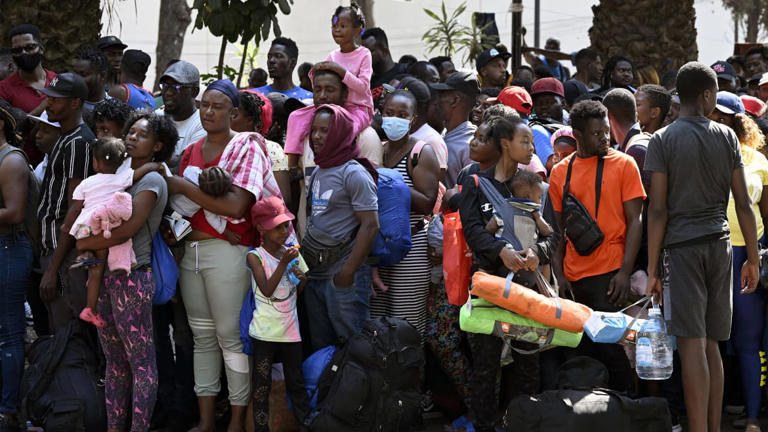Could the racial factor play a role? Amnesty International thinks so.
The migrant crisis has become a major threat to President Joe Biden’s re-election campaign. And while the needs of migrants seeking asylum and economic opportunity are rarely as urgent, the treatment of potential immigrants from Northern Triangle countries in the United States is very different from that of arrivals from Haiti.
For what ? If the argument is based on humanitarian aid, support and respect for human dignity, then Haitians should certainly not be immediately sent home as they flee their country for their lives.
Don’t get me wrong, I’m not privileging humanity or the validity of the needs of one group over another. Both deserve support and mostly come from destabilized environments in their home countries.
However, the reality is that Latino migrants, who often come to the United States for economic reasons, are treated more favorably than black Haitians fleeing a failed, lawless and violent state. In recent weeks, armed gangs have attacked federal buildings, resulting in the deaths of dozens of Haitians and rendering 15,000 people homeless.
Widespread violence across Haiti, particularly in its capital, has become pervasive. Gang wars led the Prime Minister to resign. A state of emergency and nighttime curfew have been imposed to try to curb gang attacks in Port-au-Prince. However, gangs continue to act with impunity. Additionally, the United States has implemented several unfortunate policy decisions that only worsen the situation for Haitians, such as the mandatory use of a mobile application form (CBP One) to apply for asylum. Racial discrimination and violence against Haitian refugees in Mexico have been cited as major concerns by Amnesty International.
Much like facial recognition software used across America, which has shown bias when recognizing black faces, the CBP One app demonstrates bias. The Guardian reported: “The US government’s mobile app for migrants to seek asylum at the US-Mexico border blocks many black people who cannot apply due to facial recognition bias in technology, according to immigration advocates. » People with darker skin tones face difficulty registering through the CBP One app, depriving them of the opportunity to seek asylum.
Former President Donald Trump sent thousands of Haitians back to their country on deportation flights. However, President Biden has not improved the situation much, as Haitian asylum seekers continue to be deported despite their government’s instability, political assassinations, and crumbling infrastructure. Currently, there is a lawsuit in DC federal court accusing the Biden administration of racial discrimination and human rights violations against Haitian asylum seekers.
Haitian migrants are not at the forefront of humanitarian appeals for migrants across America, nor are they the focus of diplomatic efforts or considerations in the 2024 election. There are no work permit applications for Haitian migrants. Haitian refugees, nor widespread calls for housing assistance. The overall rejection of this population is alarming.
According to the International Rescue Committee (IRC), more than 90% of Haitian asylum seekers in Mexico do not have the resources to cover their basic needs. This results in virtually all Haitian asylum seekers lacking access to food, housing and essential information (while translation from Spanish to English is often available for asylum seekers). Latin asylum, the translation into Creole is much less accessible).
As American voters debate the merits of humanitarianism toward migrants and who deserves a chance at a path to citizenship, Haitian migrants are relegated to the background. They are largely invisible to the U.S. immigration system and are often ignored or considered unworthy.
According to a recent report from NBC News, the United States continues to expel Haitians intercepted at sea, despite violence in their home country. This should spark outrage among those campaigning for immigration reform and the basic human rights of asylum seekers. However, when it comes to Haitian migrants, both the activist community and elected leaders consistently fail.
Could the racial factor play a role? Amnesty International thinks so.
Last June, on World Refugee Day, Amnesty International criticized the Americas for anti-black racism in accepting asylum seekers. “Racist migration and asylum policies only compound the harm already inflicted on people forced to endure and flee Haiti’s humanitarian and human rights crises,” said Erika Guevara-Rosas, director of the Americas at Amnesty International. “States of the Americas must fulfill their international human rights obligations without discrimination, evaluate
the protection needs of Haitians seeking refuge under fair and effective asylum procedures, and refrain from returning them to Haiti,” she added.
Jamel Connor of the American Immigration Lawyers Association (AILA) aptly described US complicity in the ordeals endured by Haitian refugees. “The United States does not have the right to turn its back on Haitian immigrants… American asylum laws allow the United States to install pro-American governments around the world and exploit the resources of those countries. Once there are no more resources to exploit or profits to obtain, the U.S. government turns a blind eye to the suffering of the people it abandons. »
Increasing violence has led to the evacuation of American citizens from Haiti, but so far there is no safe haven for Haitians themselves. According to Allen Orr, former president of AILA and director of the Haitian Bridge Alliance, “It is time to do more than simply evacuate American citizens; we can also provide protections to Haitians who are currently under deportation and in need of temporary protected status. »
The United States has a responsibility to enable Haiti to build a future of prosperity and security, but in the short term, we must recognize and support asylum seekers in desperate need. A comprehensive and humane immigration reform policy cannot exclude or ignore the dire situation in Haiti.
source : Haitian Refugees Are Treated Worse Than Latino Migrants (thedailybeast.com)









